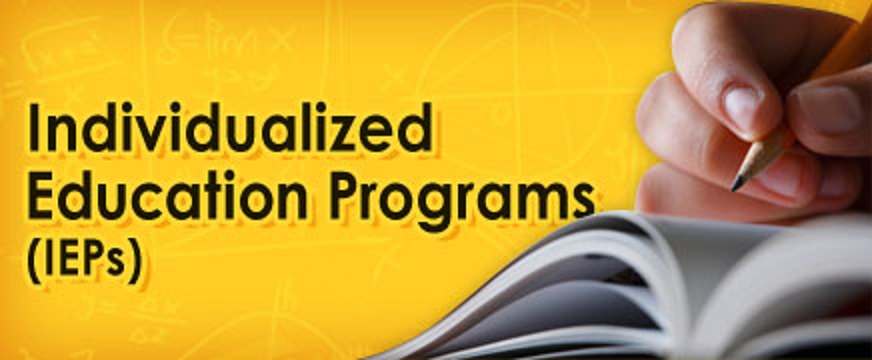IEP and IFS Plans

An Individualized Educational Plan (IEP): (Age 3-22)
This document is a statement of a child’s current level of educational performance and an individualized plan of instruction including the goals, specific services to be received, the staff to carry out the services, the standards and timelines for evaluating progress, and the amount and degree to which the child will participate with typically developing peers (Least Restricting Environment). The IEP is developed by the child’s parents and the professionals who evaluate the child and/or are providing the services. It is required by Individuals with Disabilities Education Act (IDEA) for all children eligible for special education.
Individual Family Service Plan (IFS): (0-3)
The written document that defines the early intervention services provided to the child and family. The program is designed to meet the needs of the child and the family and is based on family identified family priorities.
Types of IEP Meetings
The IEP Team shall meet:
When a formal assessment has been conducted.
At least annually to review progress, goals, and objectives and make any revisions to the
IEP unless otherwise agreed to by the parent.
At least every three years to determine continued eligibility.
Within 30 days after a parent or education staff member requests a meeting to review and/or revise the IEP.
When a student demonstrates a lack of anticipated progress.
When placement in a more restrictive setting is under consideration.
Within 30 days after an administrative placement of a student into any special education program.
To discuss and agree upon any substantial changes to IEP services.
To develop a Behavior Support Plan
Within 10 school days of any decision to recommend a student for expulsion
Following 10 days of suspension for a Manifestation Determination meeting.
Initial IEP
The IEP is convened at the conclusion of the assessments conducted to determine initial eligibility. Anyone may refer for special education eligibility assessment but, of course, parents must be in agreement and give written permission through a signed assessment plan. Assessment must be conducted in all areas of suspected disability.
Plan Review
Once a student has been found to be eligible for Special Education and related services, a review of the IEP placement, related services and supplemental aids and services shall be held annually.
The annual review procedures should be conducted so the IEP that is to be the basis of an upcoming school year’s programming is finalized prior to the start of the new school year. There must be an IEP in effect at the beginning of each school year.
Parents shall be provided with a copy of their Parent’s Rights prior to or at the annual and triennial review. The case coordinator shall be responsible for coordination of the review. When a parent requests an IEP review the IEP team meeting shall be held within 30 days of the request.
Prior to the annual review either (formal or informal) assessment may be conducted by the appropriate specialist in those areas in which major instruction has occurred, and which originally documented the student’s disability.
When reviewing a student’s progress at the annual IEP review, the IEP team must consider the following when determining whether changes are needed in the student’s program:
Any lack of expected progress toward the student’s annual IEP goals and in the general education curriculum, where appropriate.
The results of any reevaluation.
Information about the child provided to, or by, the parents.
The child’s anticipated needs.
Any other relevant matters.
Amendment/Review Meeting
An IEP meeting shall be held at least annually and more frequently if requested by the parents or a member of the IEP team. The IEP review meeting must be held within 30 calendar days of the request for the meeting. The purpose of a review IEP shall be to discuss additions and/or revisions to the IEP that are necessary to provide FAPE for the student. For a review IEP meeting, only those IEP team members whose services are being discussed are required to attend, although all members of the IEP must receive a copy of the revised IEP document/amendment IEP. The IEP may be amended between the annual IEP meetings if agreed to by the parents and the LEA. The amendment or modification to the IEP shall be in writing.
Eligibility Evaluation
A reevaluation of the student shall be conducted at least once every three years or more frequently, if conditions warrant a reevaluation, or if the student's parent or teacher requests a reevaluation and a new individualized education program is to be developed.
As part of any reevaluation, the individualized education program team and other qualified professionals may consider the following as appropriate:
Review existing assessment data on the student, including assessments and information provided by the parents of the student, current classroom-based assessments and observations, and teacher and related services providers' observations.
On the basis of this review and input from the student's parents, identify what additional data, if any, is needed to determine:
Whether the student continues to have a disability described in paragraph (3) of Section 1401 of Title 20 of the United States Code.
The present levels of performance and educational needs of the student.
Whether the student continues to need special education and related services.
Whether any additions or modifications to the special education and related services are needed to enable the student to meet the measurable annual goals set out in the individualized education program of the student and to participate, as appropriate, in the general education curriculum.
The assessor shall administer tests and other assessment materials as may be needed to produce the data in accordance with the assessment plan.
If the IEP team and other qualified professionals, as appropriate, determine that no additional data is needed to determine whether the student continues to be an individual with exceptional needs, the District shall notify the student's parents of that determination and the reasons for it, and the right of the parents to request an assessment to determine whether the student continues to be an individual with exceptional needs; however, the District shall not be required to conduct an assessment unless requested by the student's parents.
If the parents request additional assessments, the District will either complete the requested assessment or initiate due process to demonstrate why additional assessment is not required. If parents do not request additional assessment, they may not seek an independent educational evaluation until the District has an opportunity to complete an assessment.
30 Day Interim Placement/Transfer Students
If a student with a disability (who had an IEP that was in effect in a previous district within the state) transfers to a new district in the same state and enrolls in a new school within the same school year, the new district (in consultation with the parents) must provide the student with FAPE, including services comparable to those described in the previously held IEP. Within 30 days of enrollment in the new district, a review IEP must be held to adopt or revise the previously held IEP or develop a new IEP.
Manifestation Determination
A “manifestation determination” means the evaluation of the relationship between a student’s disability and the act of misconduct. This determination must be undertaken when a district proposes to take specific serious disciplinary actions such as suspension or expulsion. Only if the District concludes, after performing a manifestation determination review that the misconduct was not related to the student’s disability, can it impose the proposed disciplinary sanction. The exception to this is removals for “special circumstances, i.e., weapons, drugs or infliction of serious bodily injury; these removals can be made without regard to whether the behavior is a manifestation of the disability.
